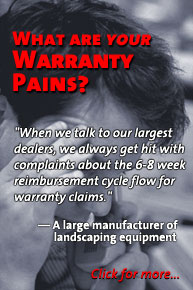June 29, 2004 |
ISSN 1550-9214 |
|
Editor's Note: This column by Dr. Ekkehard Helmig, a lawyer located in Wiesbaden, Germany, is the latest in a series of contributed editorial columns. Readers interested in authoring future contributed columns can click here to see the Guidelines for Editorial Submissions page. Warranty in Europe:As a major part of consumer protection, warranty has a high priority in the policy of the European Commission. Consumers are protected by mandatory warranty periods of two years, by legal instruments to guarantee access to the aftermarket for automotive spare parts and by stringent rules for product safety. However, increasing warranty costs in the automotive industry may indicate that the reality of product quality has not yet met the requirements of those legal rules. A warranty industry association is needed to satisfy consumers and to reduce these tremendous costs.by Dr. Ekkehard Helmig
What is warranty? It is nothing else but the responsibility of the manufacturer of a product for the compliance of his product with agreed or reasonably expected characteristics of the product. You can look at warranty issues from at least four relevant directions:
Are they warranty professionals? Yes, their are warranty professionals with one thing in common: the expectation of products without warranty problems. However, expectation by its nature is egoistic and therefore destroys the common sense. But professionals must cooperate in order to have good products at reasonable costs, without safety risks for the customer, without the potential of litigation by the attorneys, and rehabilitating the careers of quality managers. Talking about warranty in the European Community requires one to dig deeper into the legal systems of the individual member states. The EC now has 25 member states. Each state still maintains its own national legal system, although numerous efforts to harmonise the systems are under way. The European Commission has two relevant instruments to influence national laws: The Commission can act by the instrument of a regulation, which is directly binding and applicable in each member states, and which overrules national law. Or the Commission can publish a directive with guidelines for the respective matter. A directive is not binding, but it must be transposed into the national law of the 25 member states. This has the effect of introducing quite a bit of discretion into the lawmaking process. Based on the same directive, the 25 national rules might differ significantly from each other. High Priority in EuropeWarranty has a very high priority in Europe. The European Commission and European Parliament have a program under the headline of consumer protection until 2007. One of the consequences of this has been a high burden of cost, which must be borne by the producers. Here are some examples: Directive 1999/44/EC (Directive on certain aspects of the sale of consumer goods and associated guarantees) states in Article 2 that "The seller must deliver goods to the consumer which are in conformity with the contract of sale." This is the case if the goods:
Under this directive, as transposed into the national laws of most of the member states, the minimum warranty period of two years for consumer goods is mandatory. However, this has not uniformly extended warranty periods. In some cases it has shortened them. For instance, under the regime of this directive, most of the German automobile manufacturers have reduced formerly more lengthy warranty periods to the statutory minimum. In addition to this directive, the Commission is expected to issue a directive against unfair business practices and unfair contract clauses, which will be relevant under European competition law. Noncompliance with Directive 1999/44/EC means nonperformance with a contract clause, triggering liabilities for the seller in terms of the obligation to replace, repair, reduce the purchase price and/or compensate the buyer for damages. The seller basically has the same recourse back into its supply chain. Product Liability LawsWarranty in Europe crosses over more and more into the realm of product liability. The basic elements of Directive 1999/44/EC are mirrored in another directive from 1985 pertaining to product liability and torts, which also has been transposed into law in almost all EC member states. Under the product liability laws, the consumer has to meet the burden of proof that the product is defective and that the product has caused damage. In defense, the producer must prove that the product did not have a defect at the time it was put on the market, or that he is not the producer. The latest and most important development is Directive 2001/95/EC (Directive on general product safety). This directive has already been transposed into national law in Germany effective May 1, 2004. Most of the other member states are likely to follow suit later in 2004 and in 2005. This directive states in Article 3 that "Producers shall be obliged to place only safe products on the market." This is a clear and simple message. The definition of a safe product also reflects aspects of Directive 1999/44/EC and the directive on product liability: "Safe product shall mean any product which, under normal or reasonably foreseeable conditions of use including duration and, where applicable, putting into service, installation and maintenance requirements, does not present any risk or only the minimum risk compatible with the product's use, considered to be acceptable and consistent with a high level of protection for the safety and health of persons, taking into account the following points in particular: In addition, one must also read the definition of "product" to get the full scope: "Product shall mean any product -- including in the context of providing a service -- which is intended for consumers or likely, under reasonable foreseeable conditions, to be used by consumers even if not intended for them, and is supplied or made available, whether for consideration or not, in the course of a commercial activity, and whether new, used or reconditioned." This is a heavy burden for all producers, distributors and dealers. If you read the requirements of the definitions carefully, you might pause when you read that the directive also applies to products not intended for the use of consumers, You might also ponder the scope of the term "foreseeable conditions." In legal terms, this means that the producers, distributors and dealer must anticipate and assess prior to any distribution of the product, all the potential risks for consumers. They also must anticipate that the product might become available to the consumer although it might not be intended for this purpose. In other words, if the product is not accompanied by an unequivocal description and applicable warnings, it is not a safe product. The risk of an insufficient assessment in regard to potential risks of the product for the consumers is with the producer, distributor and dealer. This is new in Europe. Product Recall DatabaseIf a product is not safe, it is barred from being put on the market. In order to enforce the laws based on Directive 2001/95/EC, the authorities of the member states and the EC may enforce a withdrawal or recall of the product. The Commission has established a comprehensive and effective Europe-wide information system called RAPEX, which provides on a weekly base information on unsafe products in the form of a data bank accessible by all consumers. Violation of the laws under the directive exposes responsible managers to fines and compensation for damages. All items defining an unsafe product also define noncompliance with the sales contract, exposing the sellers to warranty claims. If you read the descriptions or manuals for consumer products on the European market you will find that many of them do not comply with the directive at this time. The market is simply not prepared for the consequences of the directive on general product safety dated December 3, 2001, nor is it prepared for the general policy of the Commission in favor of consumer protection. There is a big fight right now between the automotive vehicle manufacturers and the spare parts suppliers. The Commission's Regulation 1400/2002/EC of July 31, 2002 -- remember a regulation is a directly binding law without transposition -- stipulates under cartel law that any agreement or practice preventing suppliers from serving the aftermarket with original spare parts or spare parts of matching quality are prohibited (black clauses). Any violation of this regulation exposes vehicle manufacturers and suppliers to severe fines up to 10% of their turnover (sales revenue). The purpose of the regulation is to bring more competition into the spare part market, to give consumers the choice to buy spare parts under the most convenient conditions. That's good news for consumers. However, the other side of the coin is that due to increasing cost for spare parts and the maintenance of vehicles, consumers in increasing numbers are going to neglect maintenance or to repair their vehicles by themselves. Very often they do not have the skills to do this. In Germany, an estimated 16% of the 44.5 million vehicle owners follow this tendency. It is obvious that the producers, distributors and dealers of spare parts, under the regime of the directive on general product safety, now must anticipate and assess the risks of their products as installed by unskilled consumers under do-it-yourself conditions. Have a look into storefronts and shops of the independent aftermarket, and you will see that most of the spare parts are not furnished with appropriate descriptions, manuals and warnings under the definition of a safe product in Directive 2001/95/EC. Therefore, many spare parts now on the market are unsafe products. Product liability claims and warranty claims are outcomes that are easy to predict. Burden of Proof on Manufacturers & DealersAt the moment, the legal burden is with the producers, distributors and dealers. The European Commission and the European Parliament seem to have now gained an understanding of the conflict between consumers protection and the responsibility of producers. In March 2003, the European Economic and Social Committee passed a resolution calling for a better education of consumers, in order to enable them to understand the information they are given and to become competent enough to make decent decisions. However, this is just a program -- a good idea not yet cast in a legal form. The legal network in Europe imposing risks of warranty and product liability on producers, distributors and dealers is tight. Fortunately, due to the legal systems in the EC member states, the potential risks under product liability are not as great in comparison to the USA. There are no juries, there are no punitive damages, and the courts are more reluctant to side with the plaintiff. However, in my opinion, this will change first in the area of warranty. The Commission has decided to support a stronger involvement of consumers and their organizations in decision-making within the European Union. This will increase warranty claims costs in the near future. On April 27, Warranty Week raised the question: Is there a need for a Warranty Industry Association? Yes, there is a need. At least two things are not consistent: You cannot increase consumer protection without increasing the responsibility of the consumer, who must accept that it is irresponsible to use spare parts without sufficient skill. On the other hand, the quality management systems used in the automotive supplier industry are becoming more and more sophisticated under the regime of ISO 9001 or ISO/TS 16949, and manufacturing is becoming more and more expensive for the suppliers who have neither the influence over nor the capacity to assemble the vehicles. Although their added value to a vehicle excluding the cost for development is about 70%, they have to reimburse most of the quality costs of the vehicle manufacturers, which in Europe is about 10% of their turnover. Quality management systems perhaps do not have sufficient efficiency to avoid warranty issues. Otherwise the number of recalls in this industry would not have increased as dramatically as they have (up more than 400% since 1992). Warranty and quality are not cousins. They are brother and sister. They belong to the same family. In my opinion, Manufacturer Associations, Supplier Associations and Quality Associations should be the nucleus for a Warranty Industry Association that also finds room for publishers, lawyers, consumers, and insurance industry representatives, each with an understanding of the global industry and the economic and legal environment in different parts of the world. What is the goal of the warranty industry? To avoid warranty claims, to make products and their quality consistent with the expectations of the participants in the market. The tools of this industry could be lobbying for legislation, distributing information, training, and most of all, to elevate existing and adequate quality management systems to the level of direct instruments in the manufacture of products, and to harmonize the conflicts of the warranty professionals mentioned in the beginning. Dr. Ekkehard Helmig works as legal counsel for international companies in the automotive supplier industry and its European organizations. He is focused on the contractual relationship between vehicle manufacturers and suppliers, including the transposition of the requirements of the quality management systems of ISO 9001, ISO/TS 16946 and vehicle manufacturer's special conditions, into the contractual management of clients, product liability cases, and the risk management of recalls and service campaigns. | |||||||||||||||||||||||
| |||||||||||||||||||||||







